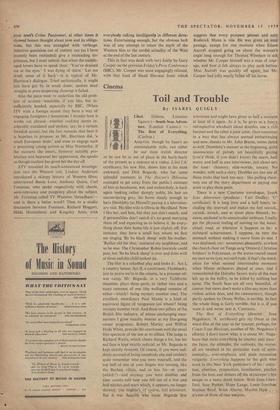Cinema
Toil and Trouble
QU1GLY By ISABEL Libel. (Odeon, Leicester Square.)—South Seas Adven- ture. (London Casino.)— The Best of Everything. (Carlton.) ASQUITH, though he hasn't an unmistakable style, can either be our most stylish director or he can be as out of place in the hurly-burly of the present as a unicorn at a rodeo, Libel ('A' certificate), his new film, shows him at his most awkward, and Dirk Bogarde, who for some splendid moments in The Doctor's Dilemma managed to get away from the public's estimate of him as handsome, wet, and melancholy, is back again looking rather damply noble, his hair an unconvincing grey, his home stately enough to have Dimbleby (as Himself) paying it a television- ary visit. His film wife is Olivia de Havilland. Now I like her, and him, but they just don't match; and if personalities don't match it's no good marrying them off and expecting us to believe it. So every- thing about their home life is just slightly off. For instance, they have a small boy whom we first see singing `Ba ba black sheep' with his mother. 'Rather old for that,' muttered my neighbour, and so he was. The Christopher Robin hairstyle could pass, but `Ba ba black sheep' is over and done with at three and this child looked six.
The film is a rehashed play and looks it : Act I, a country house; Act II, a courtroom. Flashbacks, just to prove we're in the cinema, to a prisoner-of- war camp. Mr. Bogarde, in a very Tichborne situation, plays three parts, or rather two and a nasty remnant of one (the walloped remains of either—which? being mystery number one). The excellent, unordinary Paul Massie is a kind of equivocal figure of vengeance (on whom? being mystery number two). And those two pillars of the British film industry, of whose unchanging man- nerisms I grow steadily wearier as my film-going career progresses, Robert Morley and Wilfrid Hyde White, provide the courtroom with the usual film spectacle of the law at its silliest. The judge is Richard Wattis, which cheers things a bit; but his sad face is kept strictly judicial, as Mr. Bogarde is kept strictly reverent. Of course, if you were sud- denly accused of being somebody else and couldn't quite remember who you were yourself, and the top half of one of your fingers was missing, like the Buchan villain, and so was his—or yours (which?)—and anyway you were doubles and your cousin told how you fell out of a tree and had stitches and scars which, it appears, no longer showed; you mightn't, of course, feel irreverent. But it was Asquith who made Bogarde first irreverent and might have given us half a moment at least of it again. As it is, he gives us a heavy retrospective whodunit about doubles, one a rich baronet and the other a poor actor, class-conscious in a way that has always seemed embarrassing and now, thanks to Mr. John Braine, seems dated as well. Dimbleby's manner at the beginning, quite unconscious of parody yet beautifully guying (you'd think, if you didn't know) the suave, half matey and half in awe interviewer, just about sets the tone : chummy, olde-worlde, uneasy. No wonder, with such a story. Doubles are just one of those tricks that look too easy : like pulling chest- nuts out of the story department or paying one actor to play three parts.
There is a new Cinerama travelogue, South Seas Adventure . (producer : Carl Dudley; '11' certificate). It is long (two and a half hours, in- cluding the interval) and makes me feel seasick, carsick, airsick, and at times plain filmsick, be- cause, enclosed in its semicircular embrace, I really get the physical feeling of moving on the water, cloud, road, or whatever it happens to be : a technical achievement, I suppose, to turn the stomach without making it move from its seat. t was deafened, too : sometimes pleasantly, as when the church choir on Tonga sang 'Onward, Christian Soldiers' in Polynesian, or the waves roared round my ears as we (yes, we) surf-rode, if that's the word; often for what seemed interminable moments when fifteen orchestras played at once, and I remembered the Dorothy Sayers story of the man left up in the belfry, to be killed by nothing but noise. The South Seas are all very beautiful, of course; but views don't make a film any more than violent action does, and the commentary, though partly spoken by Orson Welles, is terrible. In fact the whole thing is fairly terrible; but it is, if you want it and never saw it, Cinerama..
l'he Best of Everything (director : Jean Negulesco; 'A' certificate) gets my Oscar as the worst film of the year so far (except, perhaps, for Count Your Blessings, another of Mr. Negulesco's efforts). I don't know what it is about Mr. Negu- lesco that turns everything he touches pale puce : the faces, the attitudes, the outlooks, the stories, all are swathed in his particular wash of senti- mentality, over-emphasis, and plain screaming vulgarity. Everything happens to the girls who work in this New York publisher's of his; seduc- tion, abortion, proposition, humiliation, pinches from the boss and slithers off the skyscraper's fire escape to a nasty death below. With Joan Craw- ford, Susy Parker, Hope Lange, Louis Jourdan, Stephen Boyd, Brian Aherne, Martha Hyer . . . it's one of those all-star weepies.










































 Previous page
Previous page